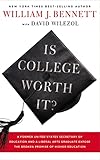Is college worth it? : a former United States Secretary of Education and a liberal arts graduate expose the broken promise of higher education / William J. Bennett and David Wilezol.
Material type: TextPublisher: Nashville, Tennessee. : Thomas Nelson, 2013Description: xvi, 278 pages : illustrations ; 21 cmISBN:
TextPublisher: Nashville, Tennessee. : Thomas Nelson, 2013Description: xvi, 278 pages : illustrations ; 21 cmISBN: - 9781595552792
- Education, Higher -- United States
- Universities and colleges -- United States
- College students -- United States
- Educational planning -- United States
- Educación superior -- Estados Unidos
- Universidades -- Estados Unidos
- Estudiantes universitarios -- Estados Unidos
- Planificación educativa -- Estados Unidos
- 20151200
- 378.73
- LA 227.4 B472i 2013
| Item type | Current library | Home library | Collection | Shelving location | Call number | Vol info | Copy number | Status | Date due | Barcode |
|---|---|---|---|---|---|---|---|---|---|---|
 Libro
Libro
|
Biblioteca Juan Bosch | Biblioteca Juan Bosch | Humanidades | Humanidades (4to. Piso) | LA 227.4 B472i 2013 (Browse shelf(Opens below)) | 1 | 1 | Available | 00000114109 |
Includes bibliographical references (pages 231-261) and index.
The truth about college -- The borrowing binge -- Creating a financial monster -- So is it worth it? -- The lower side of higher ed -- With eyes wide-open -- Twelve theoretical scenarios -- Schools worth attending.
In this book the author, a former Secretary of Education explores the answer to a critical question: Should we keep sending our kids to college? The American system of higher education comprises some of the best universities, teachers, and students the world has ever seen. Millions of students around the globe want nothing more in their life than to attend an American university. However, many of America's colleges and universities today have serious academic, institutional, and other performance problems, and it is quickly approaching a crisis point, if it is not there already. Despite some excellent colleges and quality programs at many colleges, too much of higher education is wildly expensive. Students often graduate having learned little, or do not graduate at all. They are subjected to all types of non-academic distractions. For these reasons, many students would be better served exploring other educational alternatives. Here the authors assess the problems of American higher education at various levels, from runaway costs to inferior academics to poor graduation rates to political indoctrination, and propose serious reforms and alternative methods for improving higher education so that it better serves students.


There are no comments on this title.